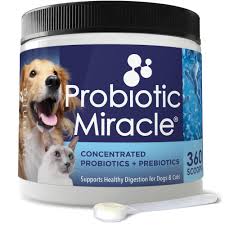As pet owners, we always want the best for our furry friends, especially when it comes to their health. One increasingly popular way to ensure your dog’s well-being is by incorporating probiotics into their diet. Probiotics for dogs help boost gut health, improve digestion, and enhance immunity. Let’s explore the benefits, how they work, and the best ways to introduce probiotics to your dog’s routine.
What Are Probiotics and Why Are They Important?
Probiotics are beneficial microorganisms that live in your dog’s digestive tract. They help maintain a healthy balance of gut bacteria, which is crucial for digestion, nutrient absorption, and immune function. Stress, illness, medications, and dietary changes can disrupt this balance, leading to digestive issues and reduced overall health.
Probiotics for dogs can counter these effects by restoring gut flora. With a healthier gut, your dog will enjoy improved digestion, better energy levels, and a stronger immune system.
Benefits of Probiotics for Dogs
- Improved Digestion
Probiotics aid in breaking down food, making it easier for your dog to absorb essential nutrients. This is especially helpful for dogs with sensitive stomachs or recurring diarrhea. - Enhanced Immune Function
A significant portion of a dog’s immune system resides in the gut. Probiotics can bolster your pet’s defenses against infections and illnesses. - Better Skin and Coat Health
Allergies and skin conditions are often linked to poor gut health. By balancing gut bacteria, probiotics may reduce itchiness, dryness, and other skin issues. - Reduced Gas and Bloating
Probiotics can alleviate uncomfortable symptoms like excessive gas or bloating, promoting a happier and more active dog. - Support for Aging Dogs
Older dogs often experience a decline in digestive efficiency. Probiotics can help maintain their gut health, keeping them spry and energetic.
How to Choose the Right Probiotics for Dogs
When selecting probiotics for dogs, consider these key factors:
- Strain Diversity: Look for products with multiple strains like Lactobacillus acidophilus, Bifidobacterium bifidum, and Enterococcus faecium. Each strain offers unique benefits.
- Dosage: Check the number of colony-forming units (CFUs) per serving. A higher CFU count means more beneficial bacteria.
- Format: Probiotics come in powders, capsules, chews, or yogurts. Choose a format that your dog finds palatable.
- Added Ingredients: Opt for products with prebiotics, which feed probiotics and enhance their effectiveness.
For quality recommendations, visit Furry Talez, a trusted source for pet care solutions.
Natural Sources of Probiotics for Dogs
If you prefer natural options, several foods are rich in probiotics:
- Plain Yogurt: Unsweetened, unflavored yogurt is a great probiotic source for dogs. Avoid varieties with artificial sweeteners like xylitol.
- Kefir: Similar to yogurt but richer in probiotics, kefir is excellent for supporting gut health.
- Fermented Vegetables: Small amounts of sauerkraut or kimchi can provide probiotics. Introduce them gradually to avoid digestive upset.
However, consult your veterinarian before adding new foods to your dog’s diet.
How to Introduce Probiotics to Your Dog
Start with a small dose and monitor your dog’s reaction. Gradually increase the dosage according to the product’s recommendations. Be consistent with probiotic supplementation, as it takes time to restore gut balance.
Additionally, maintain a balanced diet to maximize the benefits of probiotics. High-quality dog food, rich in fiber and essential nutrients, complements probiotic supplementation effectively.
Signs That Your Dog Needs Probiotics
Not all dogs require probiotics, but certain signs indicate they could benefit:
- Frequent diarrhea or constipation
- Excessive gas or bloating
- Lack of appetite
- Skin allergies or dull coat
- Stressful situations like travel or major life changes
If you notice these symptoms, consult your veterinarian for guidance on probiotics and other potential treatments.
The Long-Term Benefits of Probiotics for Dogs
Probiotics offer more than just short-term relief. Over time, they help build a resilient gut microbiome, which supports your dog’s overall health. From improved digestion to better mood and vitality, probiotics can transform your pet’s quality of life.
Remember, a happy, healthy gut means a happy, healthy dog. Investing in probiotics for dogs is an excellent way to ensure your furry companion thrives.
Conclusion
Probiotics for dogs are a natural and effective way to boost your pet’s gut health, improve digestion, and enhance their overall well-being. By choosing the right product and incorporating it into their diet, you can help your dog lead a happier and healthier life.
For more pet care insights, visit Furry Talez and explore their wide range of resources.
